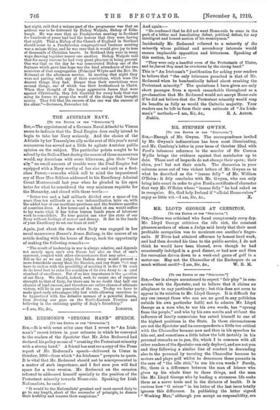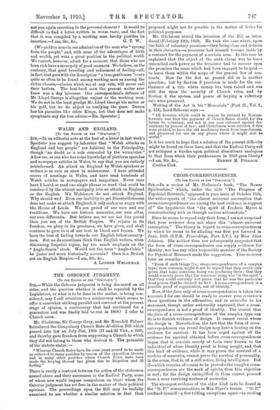[To THE EDITOR OD THE "SrEcTAToit."1 Sin,—One is always accustomed
to expect "fair play" in con- nexion with the Spectator, and to believe that it claims no allegiance to any particular party ; but this does not seem to appear in its relation to Mr. Lloyd George. It is difficult for any one (except those who can see no good in any politician outside his own particular faith) not to admire Mr. Lloyd George as a man who, to use his own words, has "sprung from the people," and who by his own merits and without the influence of family connexions has raised himself to one of the highest positions in the State. In these circumstances are not the Spectator and its correspondents a little too critical with the Chancellor because now and then in his speeches he hits out, and sometimes a little below the belt (notably in his personal remarks as to you, Sir, which I in common with all other readers of the Spectator can only deplore), and are not you and they following a similar line of conduct in descending also to the personal by taunting the Chancellor because he motors and plays golf whilst he denounces these pursuits in the case of "the idle rich," to use his own words? Surely, Sir, there is a difference between the man of leisure who gives up his whole time to these things, and the man like Mr. Lloyd George who by leading a strenuous life seeks them as a nerve tonic and in the dictates of health. It is curious how "G minor" in his letter of the last issue totally ignores this difference. In publishing the letter signed "Working Man," although you accept no responsibility, are
not you again reverting to the personal element? It would be difficult to find a letter written in worse taste, and the fact that it was compiled by a working man hardly justifies its
[We yield to none in our admiration of the man who "sprung from the people," and, with none of the advantages of birth and wealth, yet wins a great position in the political world. We cannot, however, admit for a moment that those who are born rich have a monopoly of good manners. We believe, on the contrary, that good breeding and refinement of feeling—all, in fact, that goes with the description "a true gentleman "—are quite as often to be found among working men as among the richer classes,—classes which we, at any rate, will never call their betters. The best-bred man the present writer ever knew was a day labourer. Our correspondent's defence of Mr. Lloyd George is altogether unjust to the working man. We do not in the least grudge Mr. Lloyd George his motor or his golf, but we do object to toadying the poor. Demos has his parasites like other Kings, but that does not make sycophants any the less odious.—En. Spectator.]



































































 Previous page
Previous page